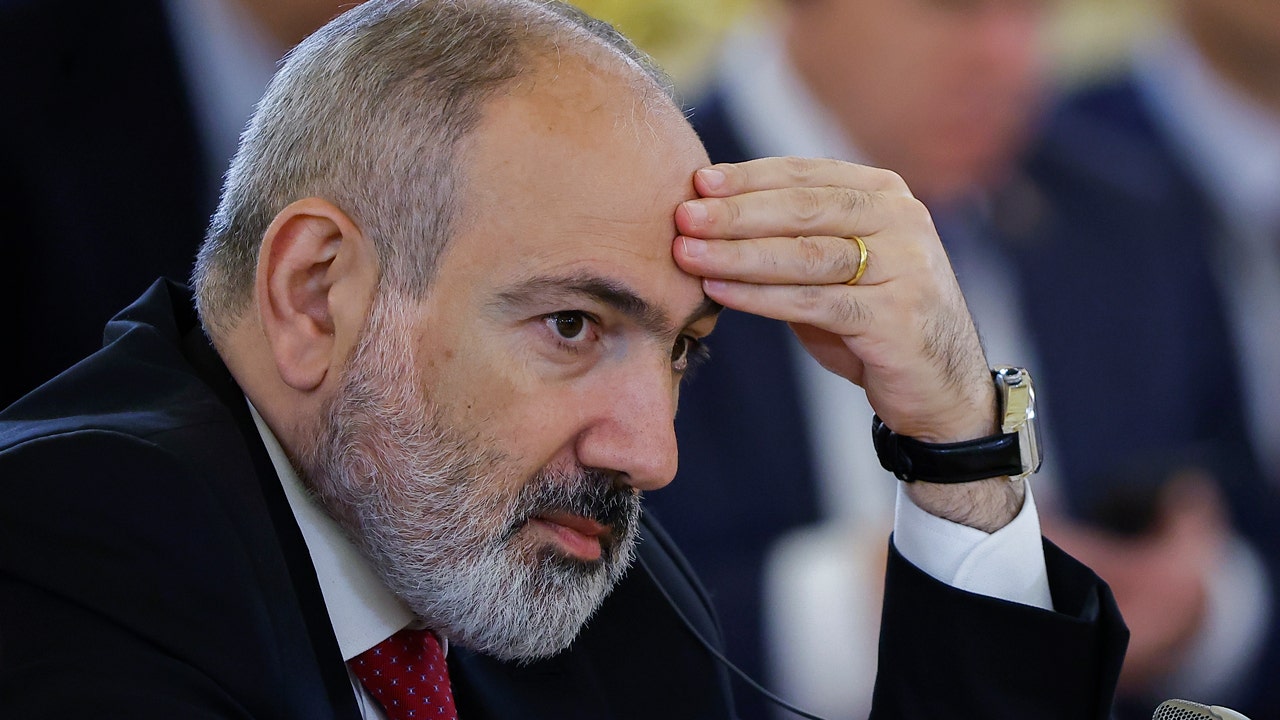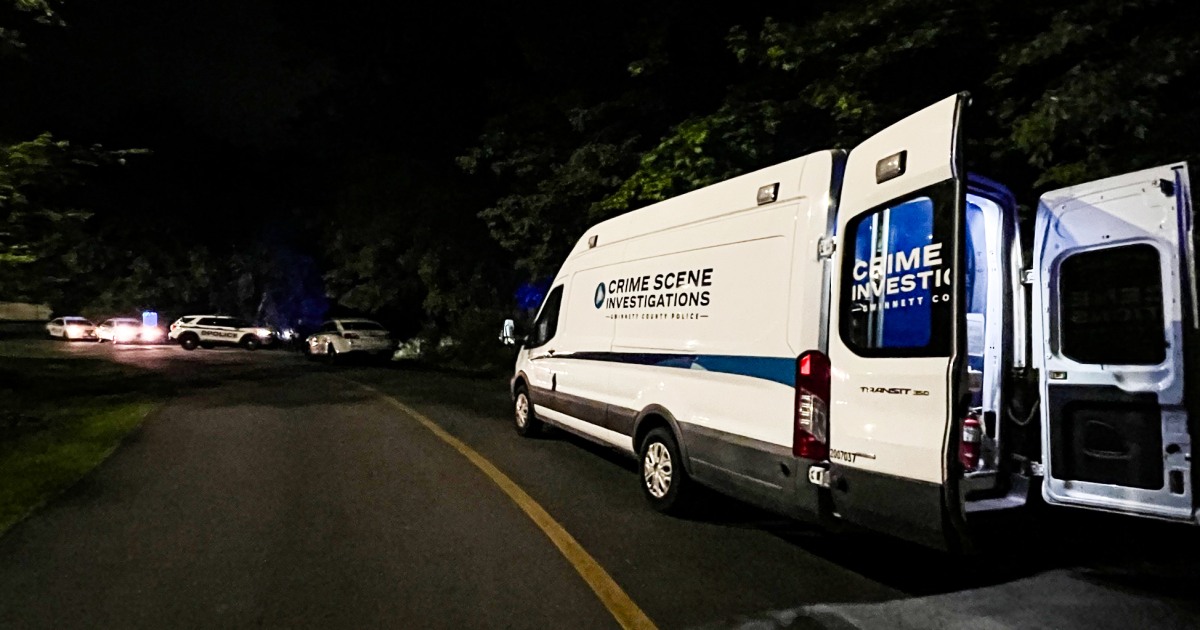Iowa
Iowa Northern Railway deal warrants heightened scrutiny

Quaker Oats plant in Cedar Rapids, photographed by David Harmantas (Shutterstock).
Scott Syroka is a former Johnston city council member.
Attorneys for Canadian Pacific Kansas City submitted a 59-page filing to the U.S. Surface Transportation Board on February 26 regarding the proposed acquisition of Iowa Northern Railway by Canadian National.
The Canadian Pacific Kansas City filing highlights the proposed deal’s “national importance” and cites “competitive concerns of significant magnitude” in calling for the Surface Transportation Board to classify Canadian National’s takeover attempt of Iowa Northern as a “Significant” transaction rather than the “Minor” transaction status that Canadian National has sought.
The distinction matters because “Minor” transactions aren’t subject to the same regulatory requirements as “Significant” transactions—meaning the public would have less access to information and less time to review the deal.
Canadian Pacific Kansas City made clear in its filing that it remains neutral for now on whether the Surface Transportation Board should approve or reject the acquisition. But it is calling for the “Significant” transaction classification “so that the Board and interested members of the public can undertake a more deliberate and thorough exploration of the competitive and other issues the Transaction raises.”
I wrote about some of those potential issues back in December. This week’s filing goes further in building a case in favor of classifying the transaction as “Significant.”
NATIONAL IMPORTANCE
The filing highlights the national significance of Iowa Northern’s service area, explaining that “The area served by Iowa Northern is of critical importance to U.S. agriculture. Cedar Rapids ranks as ‘[t]he largest corn-processing city in the world,’ hosting manufacturing plants for many familiar names, including General Mills, Quaker Oats, Cargill and Archer Daniels Midland. The Quaker Oats plant at Cedar Rapids is the largest cereal mill in the world.”
Beyond that, it underscores the importance of “efficient and competitive rail transportation” in shippers’ ability to transport “commodities like corn, soybeans and oats to processing facilities,” as well as transport “processed commodities like [dried distillers grains] DDGs, soybean oil, ethanol, and biofuels to market.”
ANTICOMPETITIVE CONCERNS
The filing notes that Canadian National and Iowa Northern are currently head-to-head competitors. For that reason, their merger would result in a “clear loss of competition” for local and international shippers alike, such as in the case of Canadian oats that are transported to Quaker Oats’ Cedar Rapids mill.
That loss of competition “would allow CN to drive up IANR’s rates (or reduce its services levels), knowing that doing so would risk nothing.” The filing continues, “All viable routes to Cedar Rapids from Canada would be controlled by CN in the future, whereas today IANR is fully independent of CN.”
The filing states, “The competitive ‘status quo’ will not be maintained. Shipper competitive options will be reduced everywhere that both CN and Iowa Northern have access, and more broadly Iowa Northern will be removed as an independent competitive force across the entire east-central Iowa region that it and CN both serve.”
DUBIOUS BENEFITS
In response to Canadian National’s claims that its proposed acquisition would yield win-win-win benefits for all stakeholders, the Canadian Pacific Kansas City filing states, “There is in fact substantial reason to be skeptical of the magnitude of the benefits CN identifies…”
For example, the filing calls into question the accuracy of the modeling Canadian National used to claim the deal would result in nearly 15,000 trucks being removed from highways.
Canadian Pacific Kansas City also argues that Iowa Northern is already meeting its shippers’ needs and does not need Canadian National to continue to do so. “In CPKC’s experience, Iowa Northern already provides quality service (and provides extra services) on an economical basis,” the filing reads. “It is not clear how CN could provide the same shipper amenities at lower cost to create rail-to-rail diversions.”
CANADIAN NATIONAL’S PR AND LOBBYING EFFORTS
There are signs that Canadian National may be getting nervous over the increased scrutiny. Recently, the company’s Public and Government Affairs team has invested significant resources in public relations and lobbying efforts regarding the deal. Canadian National has gone so far as to produce a podcast episode about the deal, lobbied local and state elected officials, launched a microsite touting the purported benefits of acquiring Iowa Northern, and bought an unknown amount of digital ads on sites like Google to promote the deal.
The microsite and digital ads avoid words like “merger,” which can often contain negative associations with reductions in quality and service, inflated pricing, and monopolization. Instead, they use more neutral words to describe the transaction, such as “combination.”
It all adds up to a significant effort to push through a transaction that Canadian National wants the Surface Transportation Board to classify as “Minor.”
COMPANY’S LOBBYING YIELDS SOME SUCCESS
To date, the following individuals or entities have sent letters to the Surface Transportation Board in support of Canadian National’s acquisition of Iowa Northern:
- Iowa State Senators Waylon Brown and Tim Kraayenbrink
- Cedar Rapids Mayor Tiffany O’Donnell
- Waterloo Mayor Quentin Hart
- Cedar Falls Mayor Danny Laudick
- Butler County Supervisors Greg Barnett, Wayne Dralle, and Rusty Eddy
- Cedar Rapids Metro Economic Alliance
- Iowa Area Development Group
- Iowa Association of Business and Industry
- Sukup Manufacturing Co.
- Hawkeye Community College, Kirkwood Community College, North Iowa Area Community College
- the SMART-TD union
These letters can be viewed within the application Canadian National filed with the Surface Transportation Board on January 30, 2024.
Alternatively, you can access Canadian National’s application and other documents related to the proposed deal by visiting the Surface Transportation Board’s website. Start here > confirm “Search For” field is set to “Dockets” > enter Docket Number “FD” and “36744” > this will display the various docket results > click on the “FD_36744” hyperlink under Docket Number > you will now be able to see a list of the filings and decisions submitted in regards to this deal, accessible as hyperlinked PDFs in the Attachment column.
FULL STEAM AHEAD FOR CANADIAN NATIONAL INVESTORS
As Canadian National chugs forward with its attempt to acquire Iowa Northern, it’s full steam ahead in terms of rewarding Wall Street investors. In its year-end earnings results released in January, the company announced a 7 percent dividend increase to shareholders as well as plans to buy back nearly USD $3 billion in stock per the latest currency conversion rate.
Canadian National did not mention any plans to pay back recent taxpayer dollars intended for short line railroads that were invested in Iowa Northern if the acquisition attempt is successful. Since 2021 alone, the U.S. Department of Transportation has awarded at least $13.9 million to Iowa Northern, including an education and training grant to improve safety on short lines across the country and a grant to fund rail improvements specifically in rural areas.
Canadian National also disclosed for the first time it had spent USD $230 million (including transaction costs) on its Iowa Northern acquisition attempt to date.

Iowa
Iowa Avenue pedestrian tunnel to be replaced this summer; Riverside bridge project paused
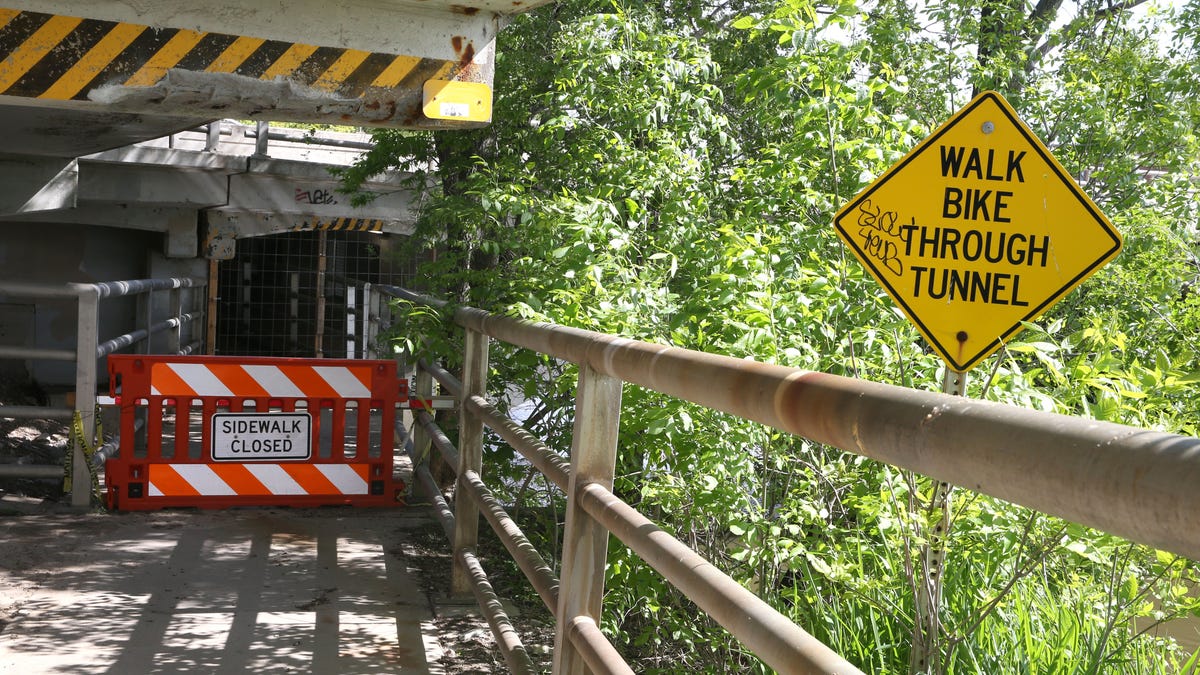
Repairs are coming to the Iowa Avenue pedestrian underpass this summer, months after it closed to the public.
The route allows residents and students to pass underneath the road near the intersection with Riverside Drive, where there is no crosswalk. It was closed in August 2023 after an inspection found the pathway approaching the underpass was deteriorating.
There also was significant cracking in the underpass, shown in photos posted on social media in the days leading up to the closure. The project will cost the city roughly $225,000.
More: Iowa Supreme Court rules for University of Iowa, reverses $12.8 million payment to contractor
The railings on the adjacent spiral walkway and on the nearby pedestrian bridge over Riverside Drive were set to be replaced, as well. However, delays in acquiring the needed steel would put that $1.25 million project outside of the summer timeframe.
The bridge is not structurally deficient and does not pose any risk to pedestrians using it or vehicles below, City Engineer Jason Havel said.
The university had asked the city to complete the work on the bridge during the summer as it receives heavy use from students and the community when school is in session.
Under a two-decade-long agreement between the city, the state Department of Transportation and UI, Iowa City and the university will each be responsible for 25% of the cost of the bridge work, or $312,500 apiece.
The project is expected to be bid later this year to provide additional time for a contractor to order the steel. Construction will then begin in summer 2025 and is slated for completion before the start of the 2025-26 academic year.
Ryan Hansen covers local government and crime for the Press-Citizen. He can be reached at rhansen@press-citizen.com or on X, formerly known as Twitter, @ryanhansen01.
Iowa
ISU graduate’s engineering expertise helps patients recover from brain injuries
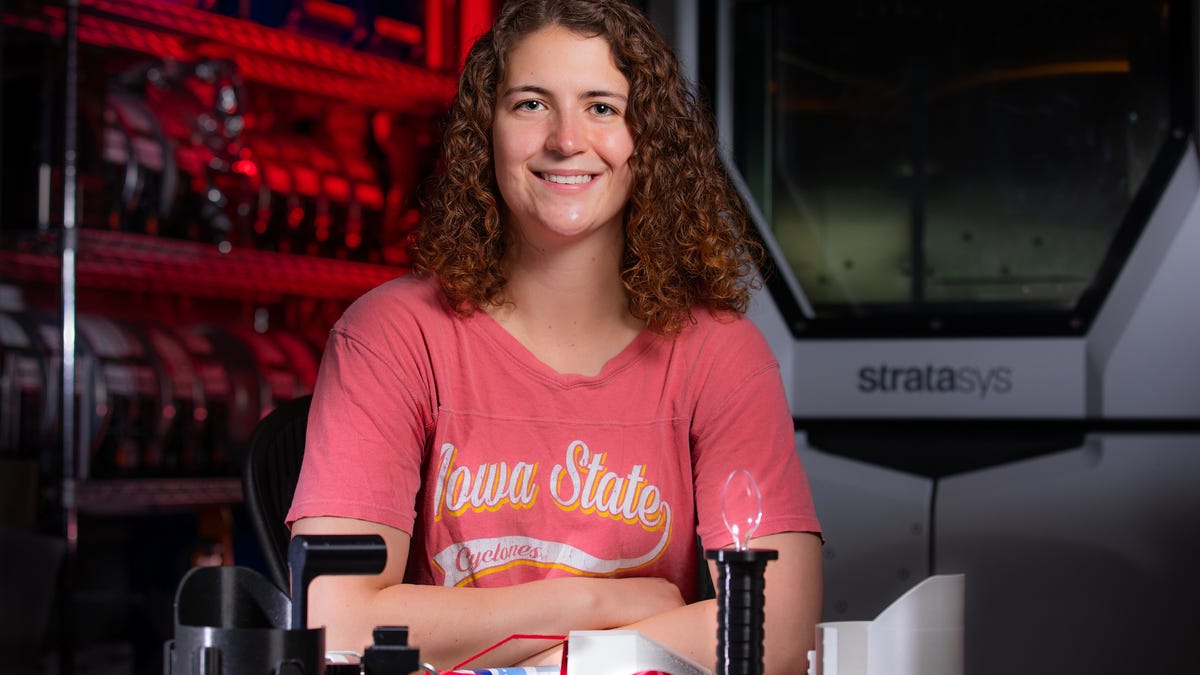
For Cassandra Swacker, engineering is a way to help people.
Majoring in mechanical engineering and minoring in biomedical engineering at Iowa State University equipped Swacker with the skills to design and manufacture personalized utensils and devices for people with traumatic brain injuries.
Her quest to help others through engineering began while she was in high school, when she saw how a prosthetic leg changed her father’s life. She’ll graduate at the end of this semester, which concluded this week, and her engineering quest will continue as she begins her career developing innovative solutions in technology and manufacturing.
“Biomedical engineers need to be involved in all those things to understand the biology and anatomy components of how machines interact with people,” Swacker said. “They also need to understand the design and manufacturing processes of those machines.”
Improving lives through engineering
Swacker, an Urbandale native, witnessed the power of biomedical engineering when her father was diagnosed with ankylosing spondylitis, a type of arthritis that can affect the spine, knees, ankles and hips. The condition caused severe wear on her father’s ankle bones. He had metal plates implanted but eventually elected to have his leg amputated below the knee and replaced with a prosthetic.
The prosthetic improved her father’s mobility dramatically. Around the same time, Swacker took an engineering design course in high school, and she started thinking about how engineering affects people, including her father, in countless ways.
“My brain had that little lightbulb moment of, ‘oh, the people who are making prosthetics are engineers,” she said.
She discovered biomedical engineering, a fast-growing field that utilizes innovations in materials and technology to develop devices and equipment to enhance human and animal health.
“When he finally got his prosthetic and I was able to see just how big of an improvement it made for him, it was really inspiring and I wanted to be able to have that direct of an impact on peoples’ quality of life, which got me interested in the biomedical field,” Swacker said.
She enrolled at Iowa State because of the university’s strong engineering programs and proximity to family. She decided to major in mechanical engineering and pick up a minor in biomedical engineering.
Made-to-order medical devices
Swacker began her first year at Iowa State during in the fall of 2020, at a time when the pandemic forced most classes to be held remotely. The challenges of the pandemic taught her to work independently on her courses. They also helped her appreciate the classroom experience when in-person instruction resumed.
She landed an internship with Iowa State’s Center for Industrial Research and Service, which partners with business and communities across Iowa to develop tailored strategies to grow and prosper. In just the last five years, CIRAS and its partners have helped more than 4,600 businesses in every Iowa county, creating an economic impact of more than $3.1 billion.
Among the organizations helped by CIRAS is On With Life, an Ankeny-based rehabilitation clinic that helps patients recover from traumatic brain injuries and other neurological conditions. Swacker saw an opportunity with On With Life to apply what she was learning in her biomedical engineering courses.
Because brain injuries manifest a wide range of symptoms, On With Life’s patients often require personalized equipment and devices. 3D printing technology offers a way to create unique devices to precise specifications, so Swacker got to work familiarizing herself with the technology.
She custom-built eating utensils, such as plate covers and silverware handles, for patients whose injuries affected their fine motor skills. The adaptive plate cover she developed clips onto the top of a plate with strategically placed gaps that expose only a portion of the food. This helped a patient whose brain injury caused a compulsion to eat too fast to slow down to a healthier pace.
On With Life CEO Jean Shelton praised Swacker’s work.
“Brain injury rehabilitation calls for an individualized approach to services,” Shelton said. “No one brain injury is like another due to the many functional areas of the brain. We are grateful for Cassie’s work as she was able to address a very specific need through technology that aids an individual and their family to manage impulse control related to food. The plate she created allowed for a balanced meal approach without the visual distraction of the other foods on the plate. The plate is still in use!”
Swacker even developed an eye for aesthetics in her 3D printing designs. She learned one particular patient, who was a fan of Harley Davidson motorcycles, didn’t like the way some of the specialized eating utensils looked. So she designed one to resemble the handlebar of a motorcycle, complete with a flame finish. Many of her designs got rave reviews from the end users, she said.
Her work with CIRAS and On With Life taught her numerous lessons about engineering design, utilizing cutting edge technology and problem solving.
In the months ahead, Swacker said she plans to move to the Iowa City area to pursue a career in manufacturing engineering. She said she’ll apply all the lessons she learned studying at Iowa State and working for On With Life as she begins her career, lessons like never hesitating to ask questions and forging relationships with the people she’s working with.
Perhaps most importantly, she’ll launch her career with firsthand knowledge that good engineering can help people and change lives.
Iowa
Iowa AEA administrators explain changes before overhaul takes effect
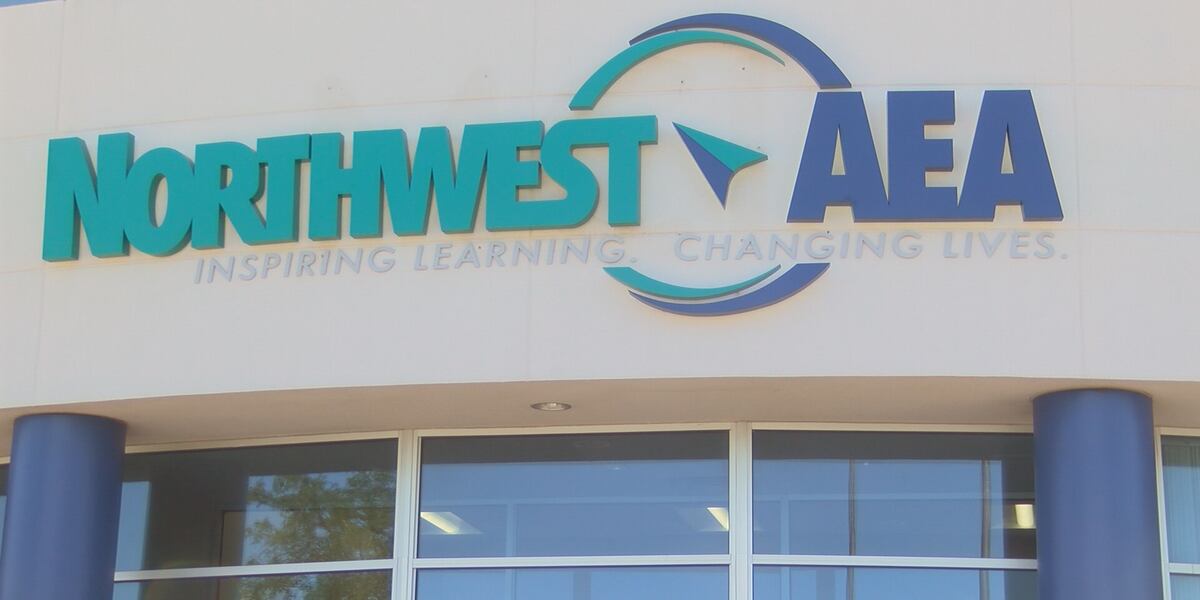
DES MOINES, Iowa (Gray Television Iowa Capitol Bureau) – Iowa’s Area Education Agencies are racing to make changes before reforms passed by the legislature take effect on July 1.
Nothing will change with special education funding this year since AEAs will get to keep 100% of funds, but significant changes are coming with media services and education services this fall.
This upcoming school year will be a transition year for AEAs. In addition to special education, they provide resources like education services, such as literacy and math coaches, and media services to help with IT and technology. Beginning in July, districts will only be required to send 40% of their funds to AEAs for it.
Cindy Yelick is the chief administrator of the Heartland AEA in Central Iowa. Yelick says staff are leaving due to the overhaul. Heartland won’t fill roughly 50 open positions, which means parents may experience less flexibility with services. However, she says they’re working to preserve as much frontline staff as possible and parents shouldn’t be worried.
Dan Cox is the chief administrator with the Northwest AEA. He says about 10% of their staff, or roughly 30 employees are leaving. Cox says the departures have been spread across the AEA so impacts won’t be too severe. Cox too says there will be some noticeable changes to services. For example, That means parents may have access to six literacy coaches rather than eight.
Gov. Kim Reynolds’ office maintains employees who leave are doing so for personal reasons and not due to the legislation.
Both AEA chiefs say making changes has been incredibly difficult.
“There’s grieving because people have really invested in that equity of services across the state for years and thinking about how you now move into a different model so there’s some sadness. I would also say that there’s part of it that is a challenge that is invigorating to people,” Yelick said.
“It’s just the unknown and then the volume of support from the public that said ‘hey, no, stop, slow this down’ and then to have that just kind of you know brushed aside and changes made anyway was really tough to take for a lot of our staff too so they’ve been through the emotional grinder,” Cox said.
Cox says parents should continue to ask teachers and their school superintendents about how changes to services will look at their school.
Both administrators say next year will be even tougher. That’s when school districts won’t be required to use AEAs for those media and education services if they don’t want to.
Copyright 2024 KCRG. All rights reserved.
-

 World1 week ago
World1 week agoStrack-Zimmermann blasts von der Leyen's defence policy
-

 Politics1 week ago
Politics1 week agoThe White House has a new curator. Donna Hayashi Smith is the first Asian American to hold the post
-

 Politics1 week ago
Politics1 week agoStefanik hits special counsel Jack Smith with ethics complaint, accuses him of election meddling
-

 Politics1 week ago
Politics1 week agoDemocratic mayor joins Kentucky GOP lawmakers to celebrate state funding for Louisville
-

 World1 week ago
World1 week agoTurkish police arrest hundreds at Istanbul May Day protests
-

 News1 week ago
News1 week agoVideo: Police Arrest Columbia Protesters Occupying Hamilton Hall
-

 Politics1 week ago
Politics1 week agoNewsom, state officials silent on anti-Israel protests at UCLA
-

 News1 week ago
News1 week agoPolice enter UCLA anti-war encampment; Arizona repeals Civil War-era abortion ban


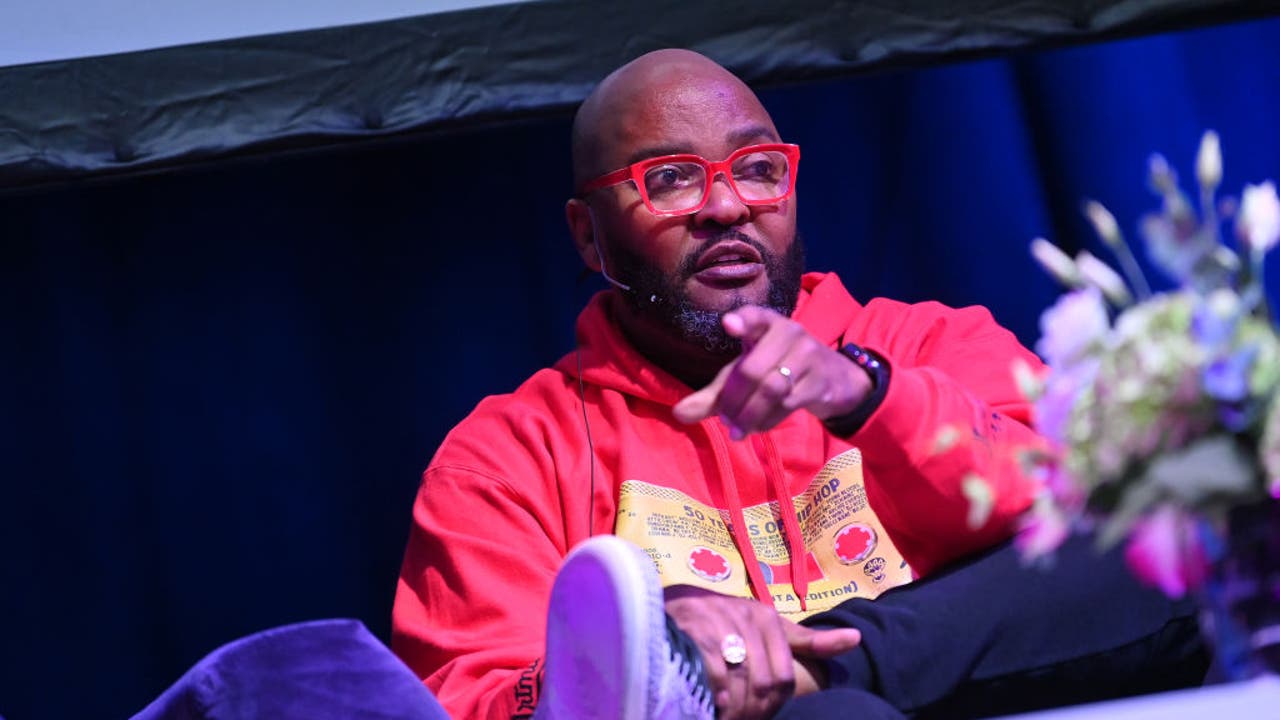
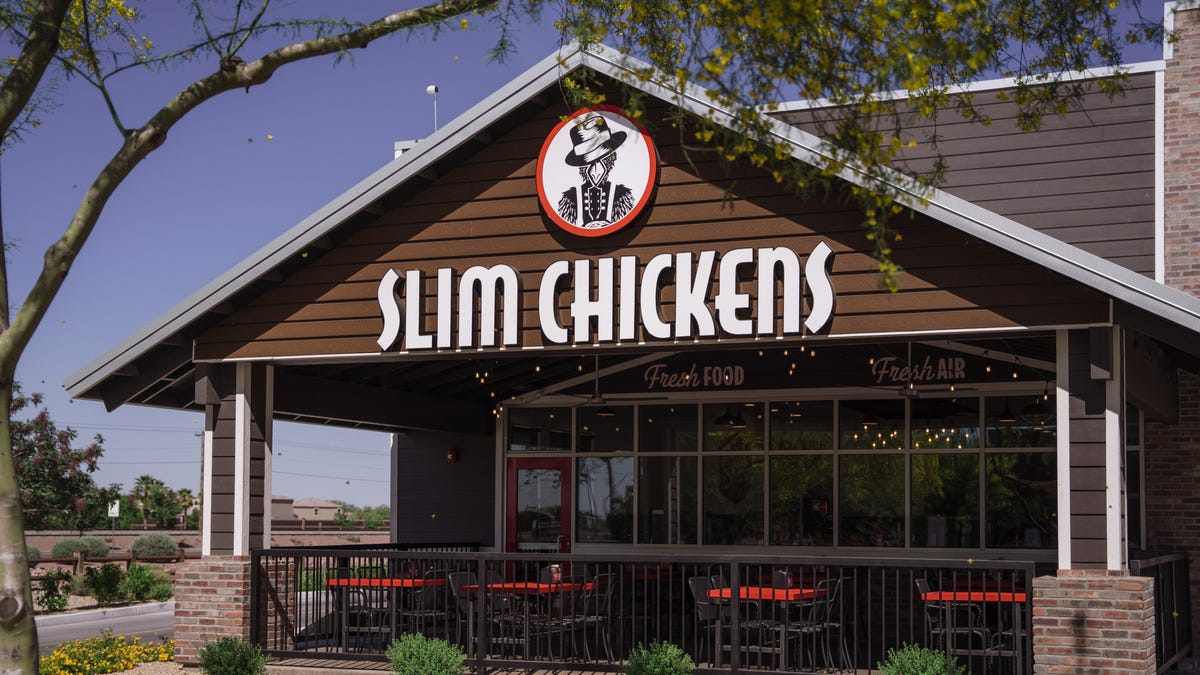

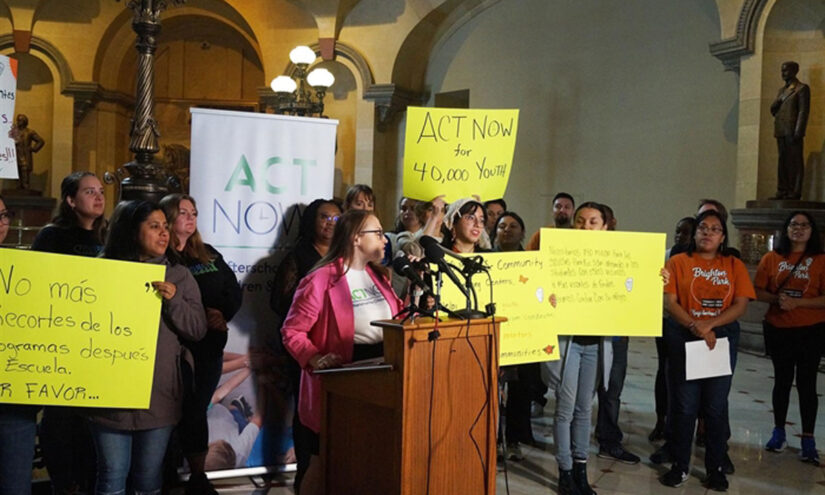


/cdn.vox-cdn.com/uploads/chorus_asset/file/24401980/STK071_ACastro_apple_0003.jpg)
